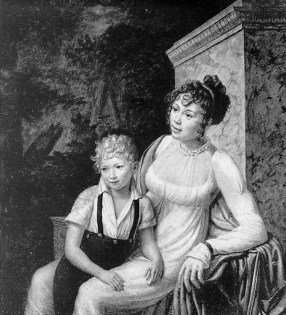Nothing amuses her. She sighs continually for the friend of her youth and seems to exist only in the recollection of past happiness. Her aversion to her husband is unqualified and unconquerable. He is vain, illiterate, talkative. A silent fool may be borne, but from a loquacious one there is no relief. How painful must her intercourse with him be; and how infinitely must that pain be augmented by the idea of being his forever? Her elegant mind, stored with literary acquirements, is lost to him . . . She finds no sympathy in the bosom of her husband. She is alone and she is wretched. (pg. 63-64)
Keywords:
no relief, infinitely,
exists only in past happiness,
silent fool, no sympathy,
lost, alone, wretched,
sighs continually for youth
When I first came across this passage, I had a completely different understanding of it. The narrator seemed to both have and be invoking sympathy towards the character Clara. The narrator also seemed to lay all the blame for Clara’s wretchedness on Clara’s husband. However, after reading through the passage again, I came to the realization that the narrator is actually severely rendering Clara in a terrible fashion. This can be recognized through the negative connotation and word choice used throughout. The narrator begins with the clipped sentence, “Nothing amuses her [Clara].” This particular phrasing alludes to the idea that Clara is impossible to please and entertain, and therefore, Clara is actually the one to blame for her displeasure in life. The continuous sighing makes Clara sound like a woman who exaggerates about everything and overly victimizes herself. The narrator also describes Clara as a dreamer but not in the positive, fluffy sort of way — instead, someone who is constantly longing after the unattainable: of youth, beauty, and the past. Clara’s “aversion” is mentioned as being “unqualified and unconquerable,” both derogatory terms. The narrator says Clara’s mind is filled with “literary acquirements,” but because we know that reading was considered harmful to the female disposition, rather than calling Clara smart, the narrator is actually making fun of Clara’s character. Based on this passage’s description, Clara not only “finds no sympathy in the bosom of her husbands” but also finds none with me.
The most important thing to note in this passage is how the narrator claims Clara has an aversion towards her husband’s “talkative” and “loquacious” nature. The narrator also suggests that Clara would rather have a “silent fool” then be “infinitely” stuck with a man such as her husband. To me, this is really ironic seeing as one of Clara’s prevalent desires, and the only thing that seems to successfully satisfy her “wretched” existence throughout the novel, is her need for “intercourse” and to experience society. We know this need existed because of the way in which Clara would act during parties and because she was so instantly charmed by the general’s company. Clara is not the only woman, literary or real, to be enchanted by societal relations. Being apart of a community was an established desire during the New World, and it is constantly being represented in literary texts, such as The Coquette and Wieland.

